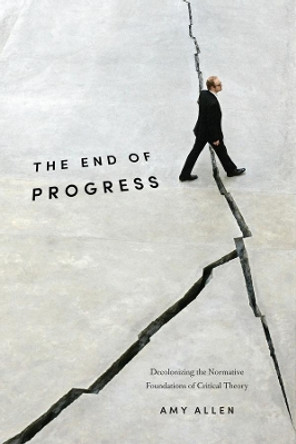Description
Countering the overly rationalist and progressivist interpretations of psychoanalysis put forward by contemporary critical theorists such as Jurgen Habermas and Axel Honneth, Allen argues that the work of Melanie Klein offers an underutilized resource. She draws on Freud, Klein, and Lacan to develop a more realistic strand of psychoanalytic thinking that centers on notions of loss, negativity, ambivalence, and mourning. Far from leading to despair, such an understanding of human subjectivity functions as a foundation of creativity, productive self-transformation, and progressive social change.
At a time when critical theorists are increasingly returning to psychoanalytic thought to diagnose the dysfunctions of our politics, this book opens up new ways of understanding the political implications of psychoanalysis while preserving the progressive, emancipatory aims of critique.
About the Author
Amy Allen is Liberal Arts Professor of Philosophy and Women's, Gender, and Sexuality Studies and head of the Philosophy Department at the Pennsylvania State University. Her previous Columbia University Press books include The End of Progress: Decolonizing the Normative Foundations of Critical Theory (2016) and Transitional Subjects: Critical Theory and Object Relations (2019, coedited with Brian O'Connor).
Reviews
Certainly, the book carefully evaluates critical theory. -- Jaeyoon Park * Contemporary Political Theory *
Allen's Critique On The Couch is clearly timely. . . More work by her or others writing within the field of critical theory is needed to address questions and issues raised in the book. -- Ali Sadeghi * Marx and Philosophy Review of Books *
In Critique on the Couch: Why Critical Theory Needs Psychoanalysis, Amy Allen makes a strong case for the relevance of psychoanalysis to any project that seeks to advance the work initiated by the first generation of Frankfurt School theorists. -- Charlene Elsby * Symposium *
Amy Allen works with many of the central authors in the field of critical theory to make the case for psychoanalysis, the analytic potential of the death drive, and the importance of retaining the notion of the unconscious. Much of this book is composed of sustained arguments with the central figures of critical theory: Habermas, Honneth, and the important contributions of Joel Whitebook. Without ever leaving the foothold in philosophy, Allen widens the terms of the debate, asking her readers to consider the important contributions that Klein and Lacan can make to a rethinking of the self, progress, and the prospects of relationality. This work is written with Allen's signature clarity and patience, pursuing arguments to conclusion rather than resting with petty skirmishes. Taken as a whole, this is a remarkable achievement of sustained attention, patient thought, persuasive argumentation. -- Judith Butler, University of California, Berkeley
Cogently argued, this superb book offers a dazzling defense of the continued relevance of psychoanalysis for critical social theory. At a moment in intellectual history when antitheory forces proclaim the demise of both critical theory and psychoanalysis, Allen shows that the intersection of these fields furnishes invaluable resources for analyzing the contours of subjectivity, relationality, politics, and social change. Critique on the Couch-especially its adroit revitalization of Kleinian theory-makes a magnificent contribution to the critical humanities. -- Mari Ruti, author of Penis Envy and Other Bad Feelings: The Emotional Costs of Everyday Life
The encounter between social theory and psychoanalysis has been a classical topos in the history of the Frankfurt School's early critical theory. Allen's bold, original, and timely book revisits this theoretical relationship with a strong systematic intention. She urges us to do nothing less than to critically rethink the social nature of the psyche as well as the imaginary dimension of contemporary politics. -- Martin Saar, Goethe Universitat Frankfurt
Ambitious, timely and thought-provoking. * Journal of Social and Political Philosophy *
Book Information
ISBN 9780231198615
Author Amy Allen
Format Paperback
Page Count 280
Imprint Columbia University Press
Publisher Columbia University Press








